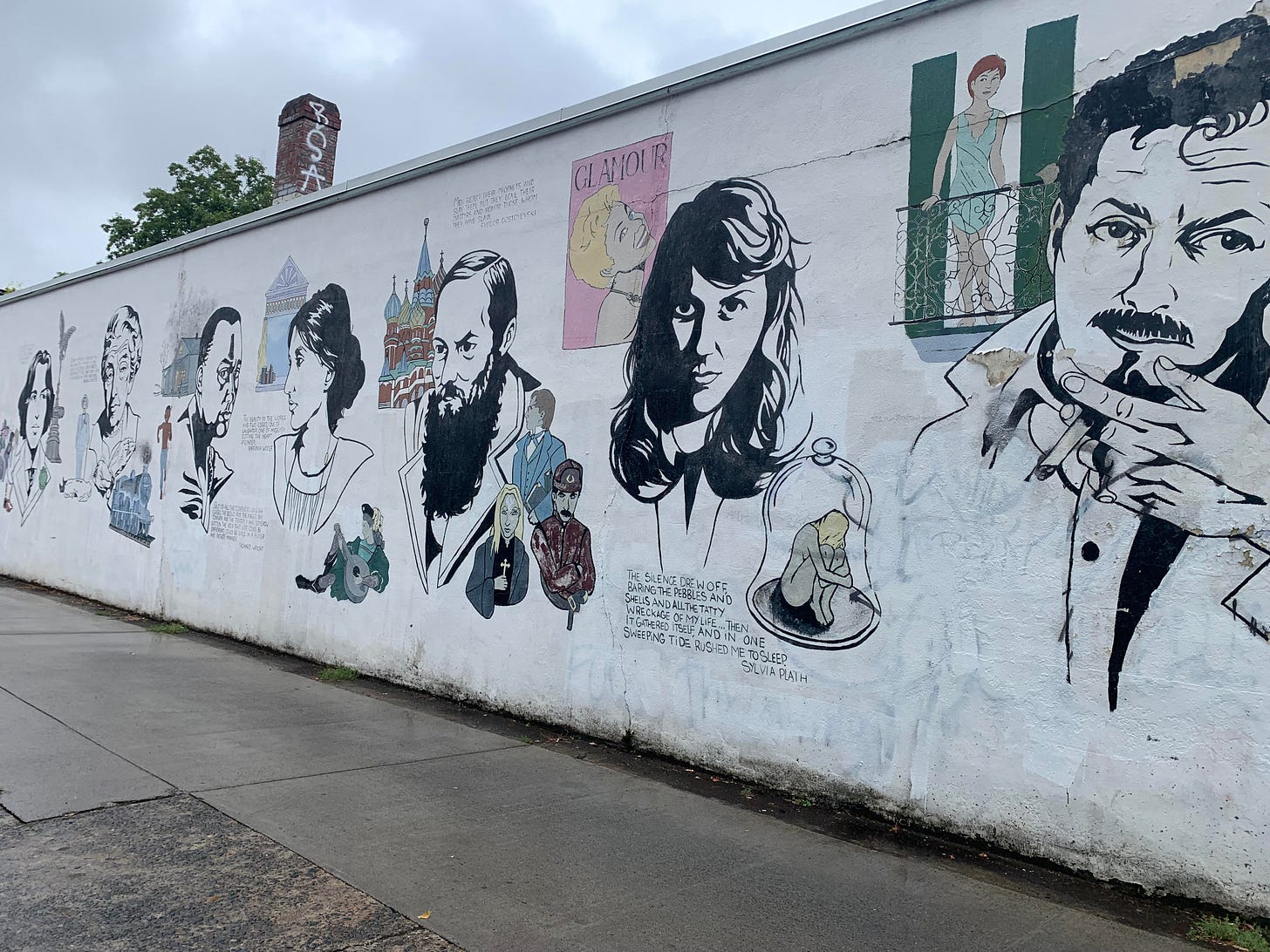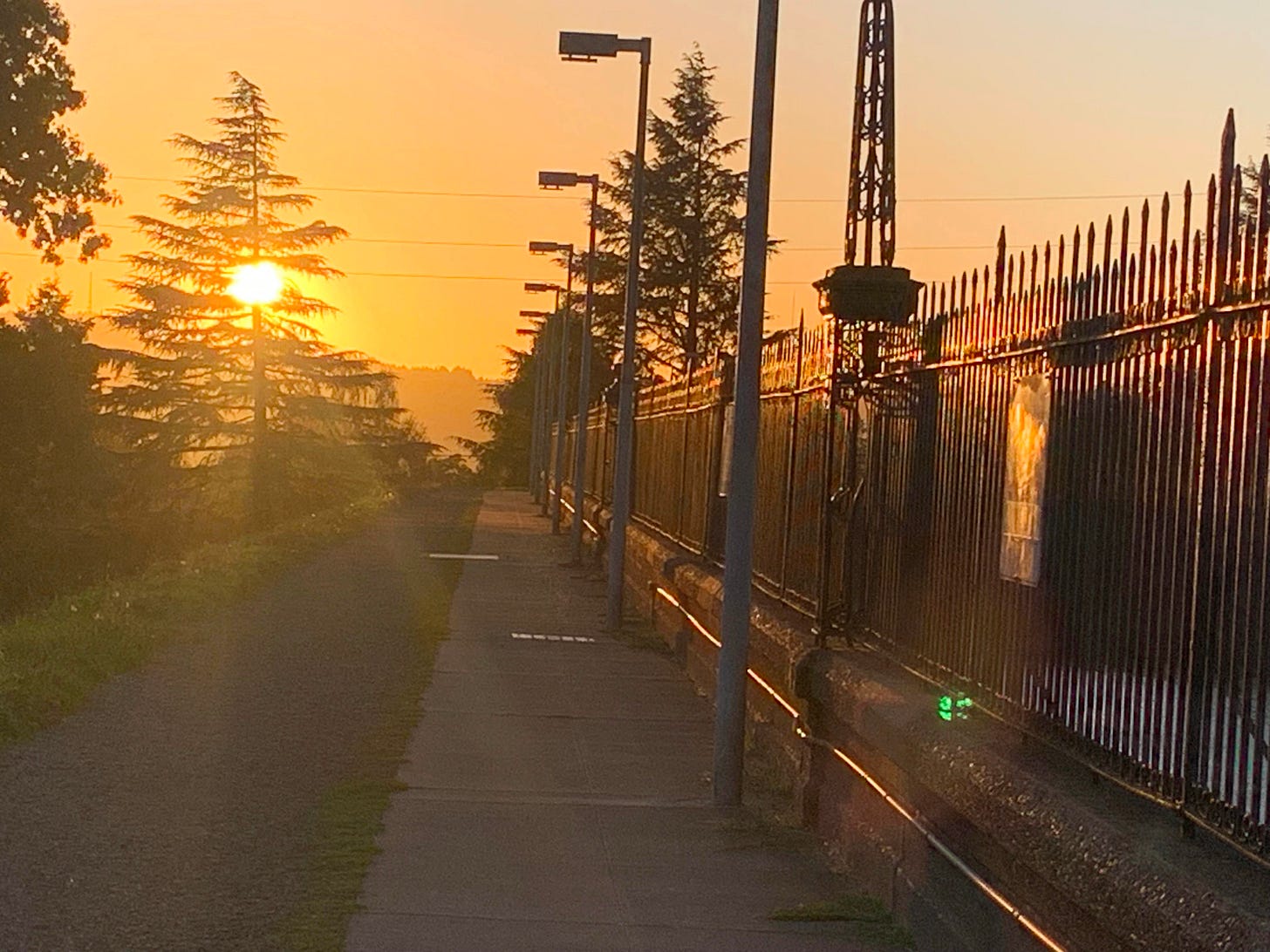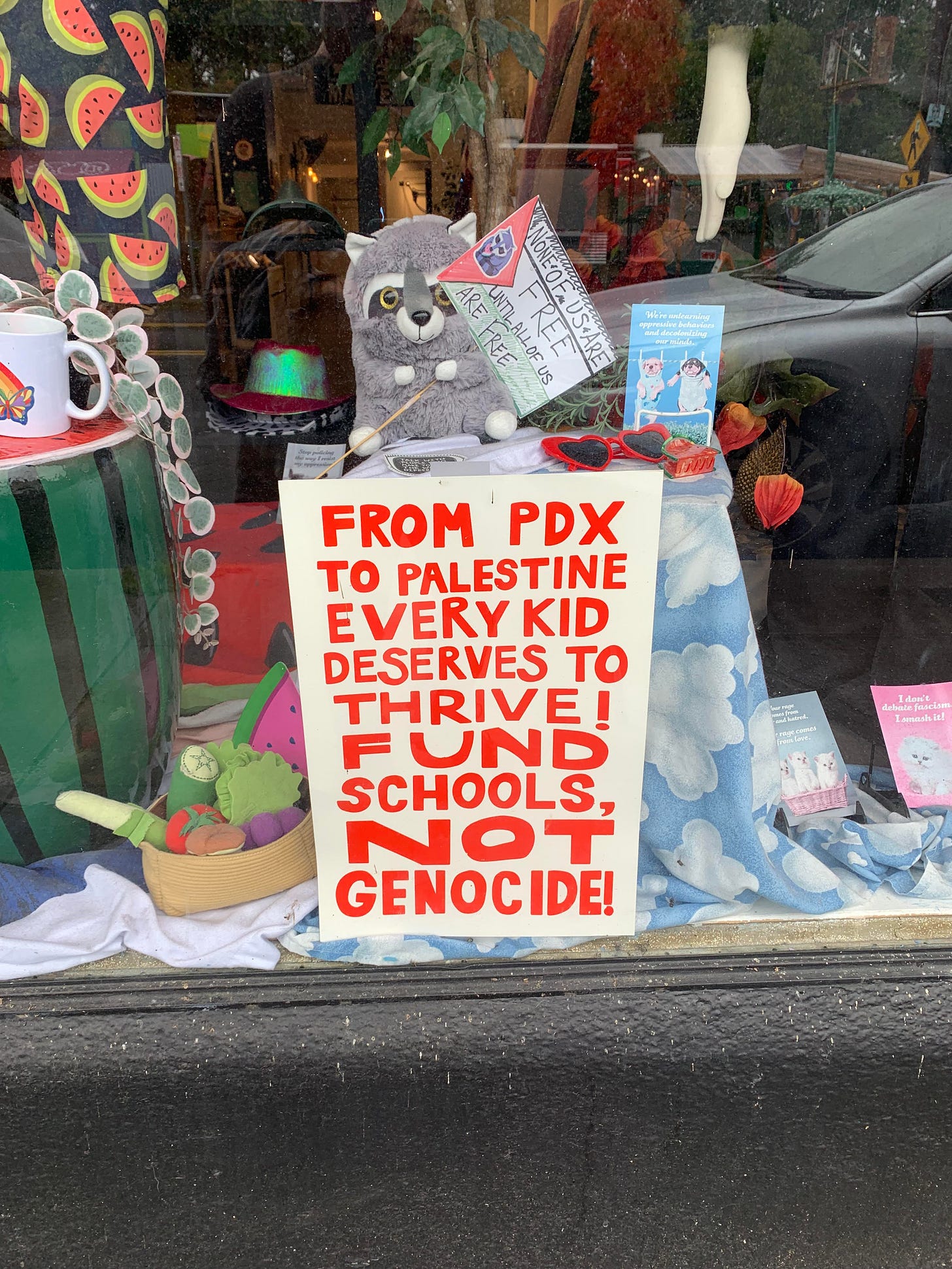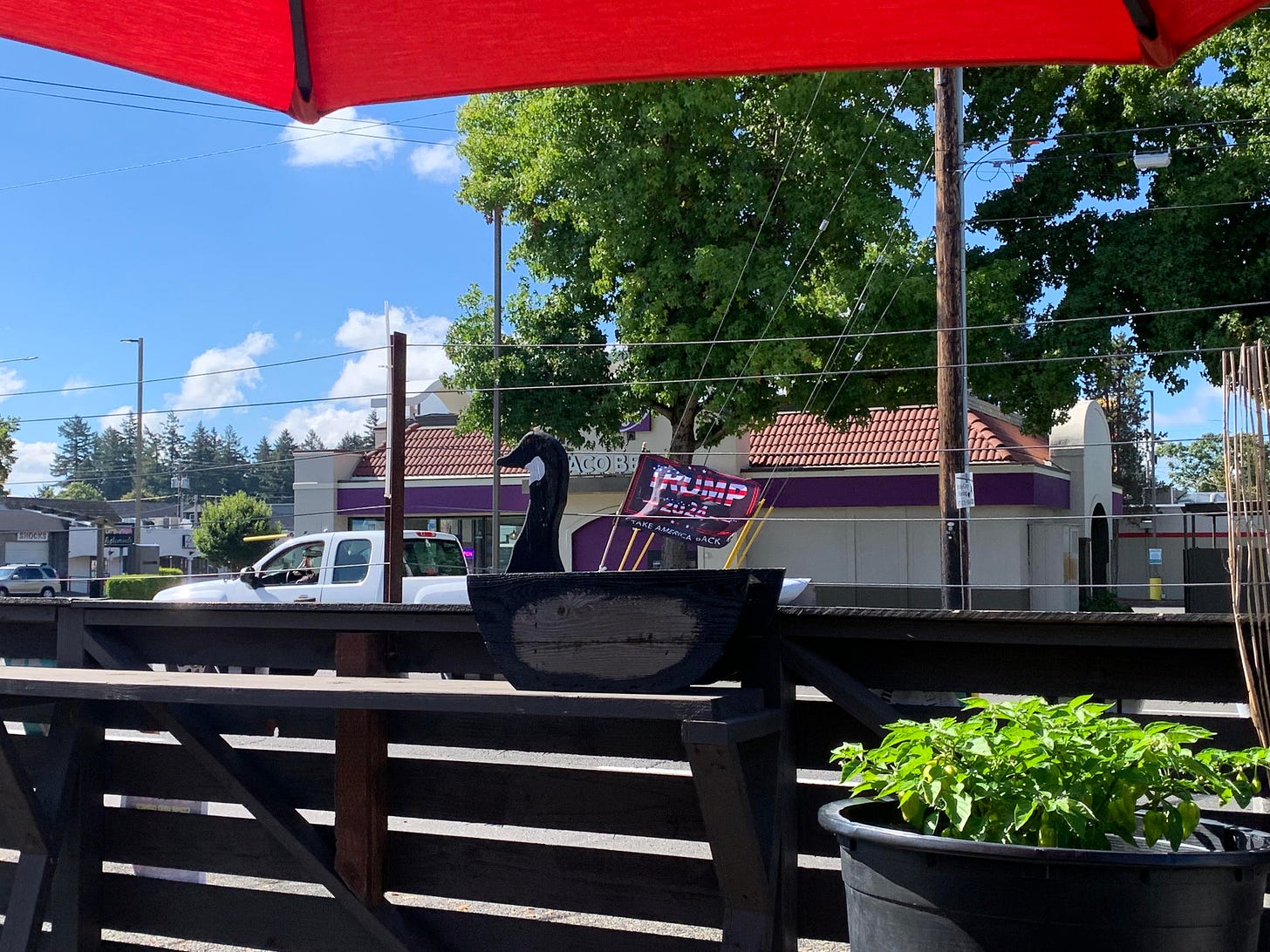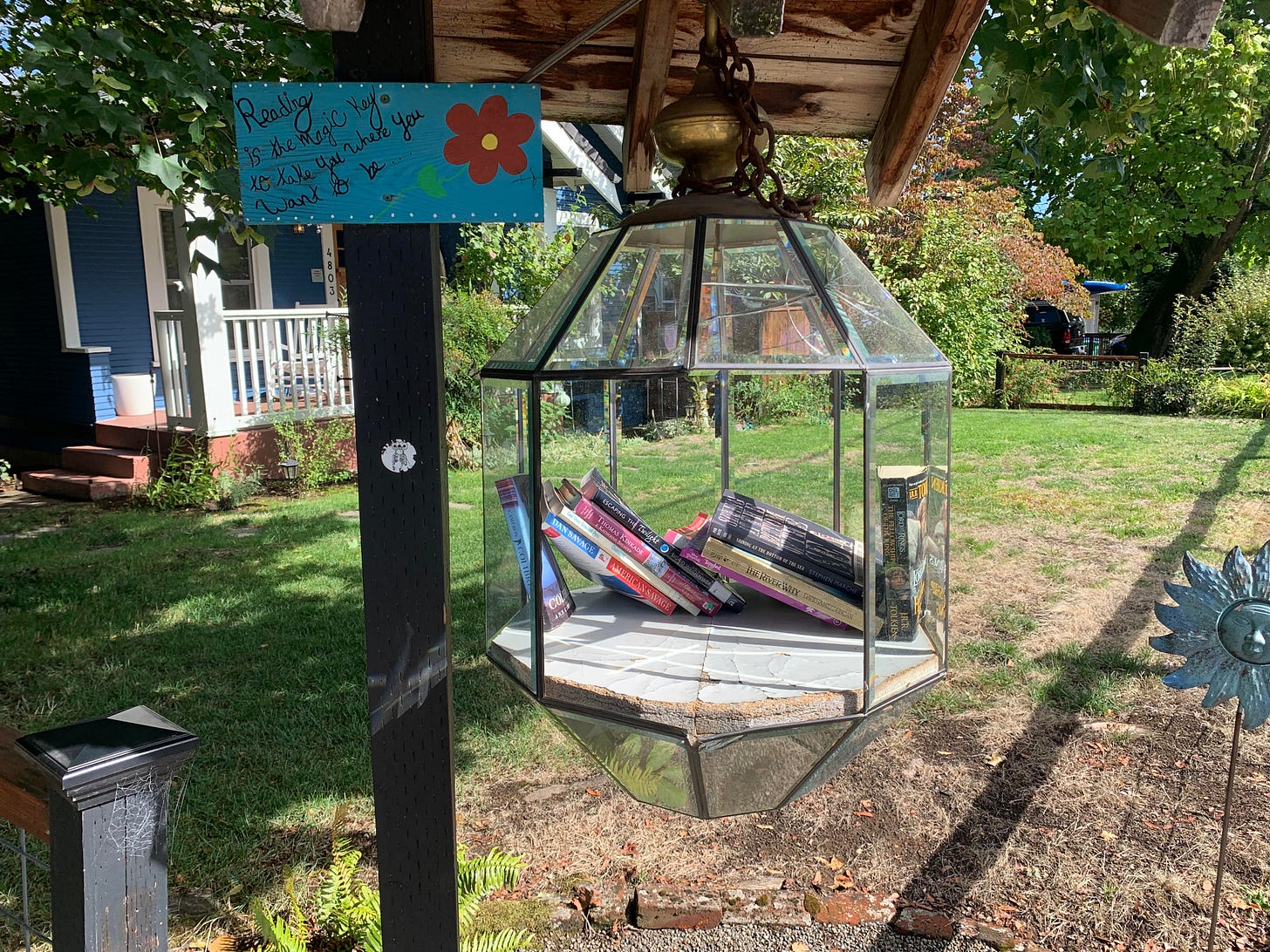As I’ve written many times before: I’m an outsider. In my view a serious writer by definition has to be. We need to be outside the norm in order to truly see the norm. You have to be outside of the tribes in order to anthropologically observe the tribes. How can a fish write about water if it doesn’t even know it’s in water to begin with? One must feel distance, separation, a gap between “them” and “me,” between conventional society and the drive to experiment with human complexity.
~
Britney and I have now lived in the lower unit of our multi-unit house in the Reed neighborhood of Portland, Oregon, for three weeks.
And?, you ask.
I like it.
Look, there’s a reason people say “KEEP PORTLAND WEIRD.” (Cause it’s freaking weird, man.) When I say “weird” I just mean: Unconventional, unusual, against the grain, not the typical status quo, etc. I said this before but I’ll repeat it: I’d rather be here, amongst generally “weird” yet often deep-thinking and intelligent unconventional folks than in Lompoc, where we moved from—where I escaped spiritual jail from—where books are verboten, Trumpers are aplenty, trucks are gigantic and deep thinking is not the norm.
That said, I would also clarify that Portland, in my experience, is also conformist. Or rather: Non-conformist-conformist. It’s the punk rocker of American cities, the small city/big town that refused to fully grow up, put on a suit, go to work and making a living. A too-big proportion of the locals look alike, for one thing; they seem to have been stuck in time, paused in early, mid 1990s Seattle. There’s a sort of expected, acceptable punk-goth-grunge-LGBTQ+ “look” which a fair majority of the people seem to work hard to produce.
I’ve seen more multicolored hair here than years prior—pink, red, green, blue, you name it. In two days I’ll see more trans people than I have the previous decade. (Ditto gender-fluid folks.) To be clear: This doesn’t bother me. I don’t really care either way. Everyone can and should do their thing. I did, and still very much do.
So I feel sort of caught, as it were, between two worlds, which seems to almost always be the case with me. I have my own sort of “anti-style” sartorial style (I’ve never been the best dresser), I’m deep, sensitive, a serious reader and thinker, a writer in all the classic, cliché ways. And yet: I’m also classically traditional in many ways. I was, after all, born and raised in southern California, in a mix of blue-collar surf culture (Ventura) and rich hippie nostalgia (Ojai).
I’ve always been caught between two worlds, two lives, two psychological binaries: Traditional, upper-class masculine mixed with weird, sensitive, a mix of male and female virtues, a sincere artist who desperately wants to be seen/heard/understood and yet is willing to jettison good opinion by others in order to tell the truth. (Or at least “my” truth.)
As I’ve written many times before: I’m an outsider. In my view a serious writer by definition has to be. We need to be outside the norm in order to truly see the norm. You have to be outside of the tribes in order to anthropologically observe the tribes. How can a fish write about water if it doesn’t even know it’s in water to begin with? One must feel distance, separation, a gap between “them” and “me,” between conventional society and the drive to experiment with human complexity.
Language is the gatekeeper: If you can put your experience down in prose, then you’ve got something to say. (Read: Orwell’s Politics and the English Language.)
Back to Portland. (I always want to say Land of Port.) It’s a beautiful place, as I’ve said before: The sparkling city, the thick calm Willamette River cutting through it all, all that thick green of wilderness everywhere, the changing of the skies from blue to gray to orange and red at dusk, the quietude and peace in the neighborhoods.
The other day I walked around our hood and ended up after ten minutes on Reed College campus. It was stunning. Ditto the mountains and trees in the distance with orange and white clouds above. I’ve always liked the feel of walking around a college campus. When I lived in El Cerrito and Oakland, in the Bay Area, I’d sometimes take walks around U.C. Berkeley, where my deceased father went in the early 1960s. There’s something calming to me about a college campus at dusk, students casually strolling around, the young laughing and smiling, life easy and fun. (Despite the roiling tensions the past few years across the country on college campuses around political matters.)
When you think of towns like Ventura or Lompoc or Boston or New York you imagine these punky abnormal people as being a freakish minority. And that’s true. But in Portland they seem to be (even if they in fact aren’t, this is the perception) the majority. The misfits you remember from high school have taken over a whole city.
People are friendly here for the most part. I do notice a sense sometimes of people averting their eyes while walking past, which brings to mind Manhattan, but I wonder how much of this has to do with the rioting and insanity of 2020/2021, which Portland has peaked from and has slowly been improving around (generally on all metrics: Police funding; drug criminalization; social anarchy; violent crime.)
Walking dogs has also shown me an underside angle of the city. I get to walk into strangers’ apartments and homes, see their inner messes, observe their intimate lives, meet their animals. It’s an intriguing exercise. It was also an intriguing exercise having an open house when still searching for a tenant for our upper unit. (By the way: We found a tenant! He moved in 9/28!)
Plenty of non-binary people showed up, along with a video journalist, a reporter for The Oregonian, a couple in the theatre/opera world, a published poet, a “they” whom I mistook for a male, and a 72-year-old ex-Berkeley progressive who stayed talking with me and Britney (she was our last visitor at the open house) for probably an entire hour. (We did eventually get into politics. Me being the contrarian I am, when I pushed back against her claim that “Trump is the end of Democracy,” it grew tense and uncomfortable. But, to her credit, she was kind, friendly, respectful and did send in an application.)
The main thing for me is the freshness, the newness of the city. I was craving change, deeply in my bones. I needed it. And I got it. It turned out to be wildly crucial: Our property management company failed us terribly and we had to fire them and go rogue, doing this on our own. (I say “us” but it’s basically Britney doing it all, with me helping from the sidelines when I can. For now I am dog-walking, doing chores, and offering support. My job was to sell my Bay Area house and purchase this house. I did that. Britney is the practical, disciplined, rational one between us, when it comes to conventional commonsense reality.)
We therefore had more power in choosing the right tenant. We were able to be totally clear with prospective tenants. We lowered the monthly rent price to adjust to the reality of the Portland rental market. Somehow, the property management company we went with—which had tons of 5-star recent reviews—were awful. Bad, slow communication; the listing agent being 5-10 minutes late every time a potential tenant showed up; sometimes people showing up without our knowledge that the place was even being shown; pricing the place too high; not allowing us to even tell the prospective tenant(s) that we were the landlords. Etc. It just didn’t work for us.
In the end I feel much more free here, because I don’t feel insecure about my true nature: I don’t feel like I have to hide or tamp down “who I am.” In Lompoc I often sensed that books, brains, sensitivity and sophistication weren’t exactly prized possessions. Here, it’s the norm. So even if I don’t “like” some of the aspects of Portland—and there are some aspects I don’t care for—I feel better and safer and cleaner here. For sure, most Portlanders’ politics are to the left of mine, often far to the left of mine. (That said: Trumpers are everywhere, people! I saw a hardcore Trumper in his truck the other day while taking a break from dog-walking. In Portland! I have to admit I respected the guy’s guts. He looked exactly as you’d expect: Sixties, white-haired, cowboy hat on, farmer-face.)
The fact that thick wilderness is everywhere, and that you can hike, bike and get on the river, but that it doesn’t feel like some tourist-bro hellhole like, say, Lake Nacimiento, is key. There’s a feeling of relaxed social nobility here, as if everyone thinks of themselves as weirdo-royalty who deserve to be praised. But I don’t miss the gigantic, loud-ass lifted trucks of Lompoc, or the Trump signs everywhere—that said: Harris/Walz signs are fucking omnipresent here, also irritating. Oh, and Black Lives Matter signs; any home without one stands out like a bright red marker on perfectly white paper.)
So there is the whole “group-think” problem here, just as there is in many American cities. Large clusters of folks who seem to think, act, talk and look more or less the same. Again, the whole non-conformist-conformist thing. I remember being a punk rocker in high school and, one night, being at a show and looking around at everyone; I realized in that moment that we all looked the same. Punk was all about “individuality,” thinking for yourself, rejecting “the system” and the status quo…and yet…what were we rejecting exactly? Weren’t we just conforming like everybody else, but with a different set of costumes?
There can be a blob of conformism for anything, including for alcoholics in AA, writers, men, women, LGBTQ+, Progressives, Conservatives, Portlanders, New Yorkers, etc. Truly free, independent thinkers are rare, especially in 2024, a time of mass conformity a la social media, political polarization, less reading, algorithms, less human contact and more time online, and the odd New Conformity of Gen Z. Everything begun by the hippies in the 1960s has been horribly realized—at least theoretically and symbolically—in Gen Z. They’ve become slaves to their iPhones, to their algorithms, to their in-groups.
Thinking on your own is still the most punk rock thing you can do. And it’s more rare now than ever.
I don’t think I’m special. I didn’t do anything profound, haven’t written anything life-changing. Like everyone, I’m nothing but a bundle of DNA, childhood experience, and inherent “me-ness.” Like everyone, I respond to incentives. I happen to possess a high level of self-awareness around certain things (and much less around others). I happen to be just a little more interested in Truth than in being liked/respected/accepted/included. (Though I very much do want the latter as well.) I happen to have in my past a wealth of knowledge gained from both rough life experience and a plethora of books.
Portland, for me, is temporary. We’re moving to Spain in six months or less. This is just a temporary stop-off. It was a door out of Lompoc, and a next step towards living abroad. For Britney it was her first chess-move away from literally everything she knew. There are always tradeoffs, always pros and cons to wherever you go, whatever you do or don’t do. Lompoc had advantages, for sure: Rugged mountain beauty, kind people, Britney’s family, my mom nearby in Santa Barbara, quiet, safety, etc. And yet that wasn’t what we were looking for anymore.
Instead, we craved newness. Something different. Something original. And Portland is original, even if simultaneously conforming to its own little bubble. There’s nowhere else like it. It’s got everything you need and plenty you don’t. I’m approaching it like an anthropologist (which is essentially what a writer is), observing the locals, trying to understand the tangled, looping freeway system here, taking in the raw natural beauty, walking dogs because they calm my soul, and talking to people who I feel at least partially understood by.
That’s a sort of freedom, for me anyway. I don’t think I’d want to live in Portland long-term, but who knows. It doesn’t matter and that’s not our goal. This is just a stepping stone, from A to B to C.


